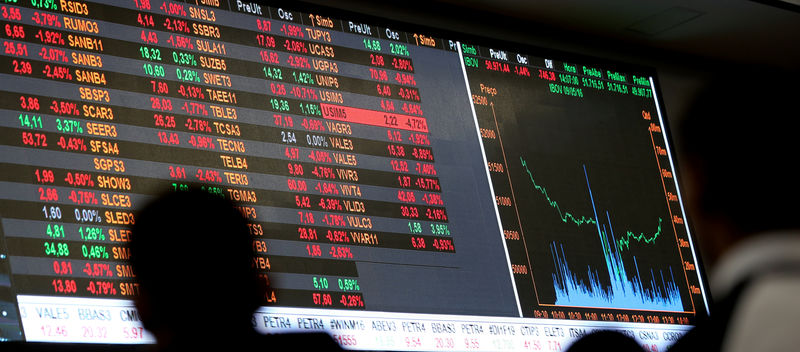By Gabriela Mello
SAO PAULO (Reuters) - Brazilian stocks are expected to post double-digit gains this year, outperforming the Mexican market, as President Jair Bolsonaro's new government pushes ahead on key economic reforms, according to a quarterly Reuters survey.
The poll showed Brazil's benchmark Bovespa stock index rising 27% in 2019 to end the year at 112,000, according to the median of 17 forecasts from traders, brokers and strategists.
That estimate is down from 120,000 in a February poll but still would bring the Bovespa's rally to about 160% since the end of 2015, making Brazil one of the world's best-performing stock markets during the period.
However, growing uncertainties about the timing and size of a long-awaited pension reform promised by Bolsonaro are clouding prospects for the market in 2020.
Only seven of the 17 forecasters consulted by Reuters provided estimates for Brazilian stocks next year due to the lack of visibility both domestically and abroad, as a global economic slowdown and U.S.-China trade dispute add to market jitters.
On average, the forecasts point to a mid-2020 level of 115,000 points for Bovespa, down sharply from 132,500 points in the previous poll. Their year-end 2020 forecast is 125,000, or a 33.5% rise from last week's close of 93,627.80 points.
"The market has already priced in the likelihood of a pension reform approval this year and now needs something concrete to further rise," said David Beker, chief Brazil economist at Bank of America Merrill Lynch (NYSE:BAC).
Rafael Passos, analyst at digital investment broker Guide, noted most of recent gains in the Brazilian stock market were triggered by local investors. "The foreigner is still on the sidelines, waiting to see if Bolsonaro has the political support needed to pass these economic reforms," he said.
The overhaul of Brazil's costly pension system is the backbone of the government's effort to close what most economists call an unsustainable public deficit and spur stronger growth after the deepest recession in decades.
Investors have cheered the prospect, even if the final law is likely to be diluted compared to an initial plan of save more than 1 trillion reais ($250 billion) in a decade.
A consensus among equity strategists is that, once approved by the Congress, the pension reform could set off a broad rebalancing of emerging market portfolios.
"The Bovespa is considerably undervalued compared to its peers, including Mexico," said XP Investimentos equity research head Karel Luketic.
The outlook for Mexico's benchmark S&P/BVM IPC index at the end of 2019 faced a smaller revision in the Reuters poll, edging lower to 47,395 points from 48,300 in February, according to the median of 12 traders and analysts surveyed by Reuters. That would mark a rise of 11% from last week's close and 14% in 2019. The S&P/BVM IPC fell 15.6% in 2018.
Almost a year after his July election, investors still fear Mexican President Andrés Manuel López Obrador could turn his back on fiscal responsibility to pursue populist policies hurting further stock market gains.
"Outflows are not significant yet, which gives the impression that investors are giving Mexico the benefit of the doubt," said Citi strategist Guilherme Assis.
He added, however, that Mexico is much more vulnerable than Brazil to downside risks related to U.S. protectionist policies, including ongoing turmoil caused by a trade dispute with China.

"If the U.S. economy slows down, it brings Mexico along," Assis said.